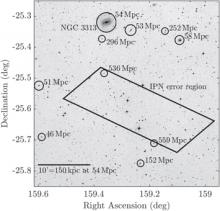
Abstract
We present the results of the search for gravitational waves (GWs) associated with gamma-ray bursts (GRBs) detected during the first observing run of the Advanced Laser Interferometer Gravitational-Wave Observatory (LIGO), which took place between September 12, 2015 and January 19, 2016. We perform a modeled search for coalescences of either two neutron stars (NSs) or an NS and a stellar-mass black hole (BH), and a search for unmodeled GW transients using minimal assumptions about the signal morphology. We search for GW signals associated with the 41 GRBs for which LIGO data are available with sufficient duration. We find no evidence of a GW signal for any of them. For all GRBs, we place lower bounds on the distance to the source using the optimistic assumption that GWs with an energy of 10−2M⊙c2 were emitted at a given frequency, and find a median 90% confidence limit of 71Mpc at 150Hz. For the subset of 19 short-hard GRBs, we place lower bounds on distance with a median 90% confidence limit of 90Mpc for NS-NS coalescences, and 150Mpc and 139Mpc for NS-BH coalescences with spins aligned to the orbital angular momentum and in a generic configuration, respectively. These distance limits are higher than any other ones placed by previous GW searches. Further, we discuss in detail the results of the search for GWs associated with GRB 150906B, a GRB that was localized by the InterPlanetary Network near the local galaxy NGC 3313, which is at a luminosity distance of 54Mpc (z=0.0124). Assuming the gamma-ray emission is beamed with a jet half-opening angle ≤30∘, we exclude an NS-NS and an NS-BH in NGC 3313 as the progenitor of this event with confidence >99%. In addition, under the same assumption for the jet half-opening angle, we found no evidence for an NS-NS and an NS-BH GW signal associated with GRB 150906B up to a distance of 102Mpc and 170Mpc, respectively.